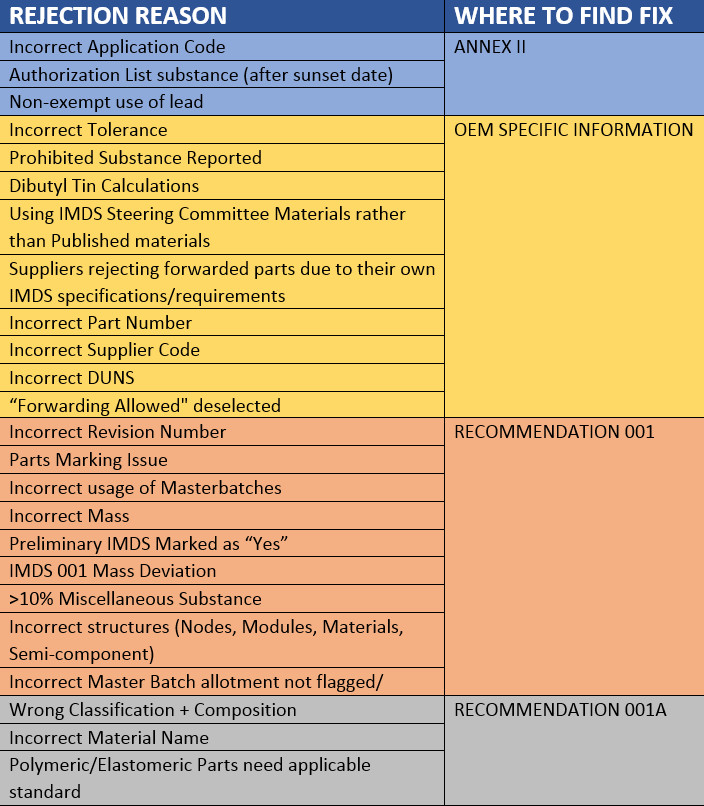For the past 15-20 years, it has been a requirement for the automotive industry to report material content of vehicle components into the International Material Data System (IMDS). In preparation for an upcoming industry-wide IMDS workshop, Tetra Tech is currently working on an extensive categorization of IMDS data quality issues. One of the fruits of our labors is an anecdotal list of some of the top reasons for rejected IMDS submissions. We are now sharing the most frequently-occurring rejections, and information on resources for most efficiently fixing those rejected submissions.
The below list outlines the Top 24 IMDS rejections based on an informal survey of several major automotive OEMs and Tier 1s. Figure One references the publicly available resources available for fixing each of these rejections. While we did not survey all global OEMs, the cross-section of companies does represent the majority of all the IMDS submissions made in North America in 2017. The survey is not a formal representation by any company of its IMDS priorities; however it is a good starting point for understanding some of the major causes of IMDS problems which are contributing to submission delays and poor data quality.
Consulting the Top 24 list and referring to the resources cited below in Figure One can save suppliers countless hours of iterative submit/reject/re-submit/re-reject cycles, and avoid the potential damage to customer relationships that results from poor data quality.
TOP IMDS REJECTION REASONS – by approximate frequency of occurrence (Tetra Tech’s Feb. 2018 OEM/Tier 1 Survey)
- Incorrect Part Number
- Incorrect Supplier Number
- Incorrect DUNS
- Wrong Classification + Composition
- Name Incorrect Material
- Incorrect Tolerance
- Incorrect Revision Number
- Parts Marking Issue
- Polymer/Elastomeric Materials need applicable standard
- Incorrect usage of Masterbatches
- Incorrect Mass
- Preliminary IMDS Marked as “Yes”
- IMDS 001 Mass Deviation
- Incorrect Application Code
- >10% Miscellaneous Substance
- Prohibited Substance Reported
- Dibutyl Tin Calculations
- Incorrect structures (Nodes, Modules, Materials, Semi-component)
- Forwarding Allowed deselected
- Using IMDS Steering Committee Materials rather than Published materials
- Incorrect Master Batch allotment
- Suppliers rejecting forwarded parts due to their own IMDS specifications/requirements
- Authorization List substance (after sunset date)
- Non-exempt use of lead
Figure One – Resources Where Fixes can be Found for IMDS Rejections

For those reporting in IMDS, it is important to know how to access Recommendation 001 which is the Rules and Guidelines for creating Material Data Sheets (MDSs). IMDS’s OEM Specific Information is the next source to consult as it provides additional information specific for each OEM. The OEM information goes beyond the basic rules and guidelines found in Recommendation 001 such as:
· Recipient Data Page required information
· Resubmission / Update requirements
· Rejection Code explanation
· Prohibited substance use

In 2018 the supply chain may be seeing dramatic changes in IMDS data quality expectations. Primary contributors to these new requirements include changes within the automotive supply base; more “bells & whistles” included in today’s vehicles; as well as additional legislative reporting requirements. OEMs are using their IMDS data to report not only for EU’s ELV Directive but other types of compliance reporting as well.
In the end, automotive suppliers need to be aware that IMDS provides the basic guidance that will help minimize rejected datasheets. OEMs are now, more than ever, paying attention to the quality of the data received by their supply base. They also provide updates to their specific requirements; generally, on an annual basis, to help the automotive supply chain stay up to date with their data reporting requirements.
If you are interested in learning, in much more detail, how to fix these, and other, data quality issues, explore our online IMDS certification trainings.






